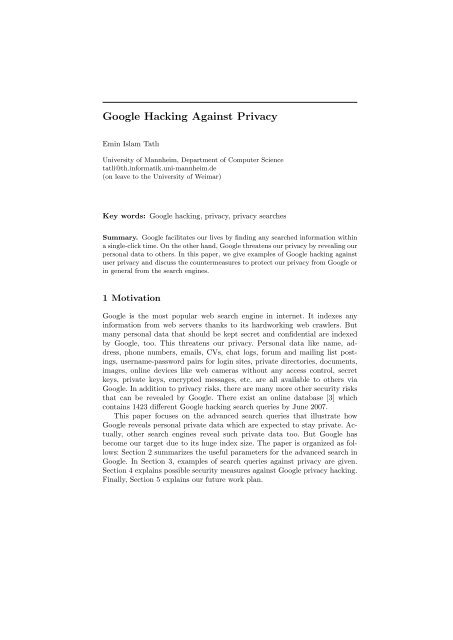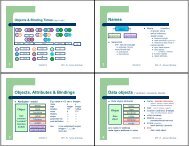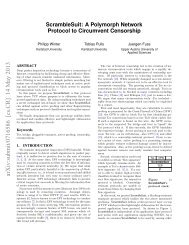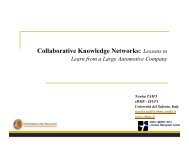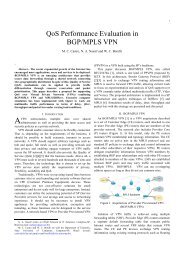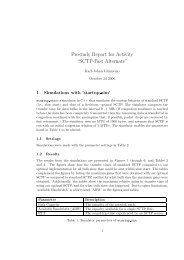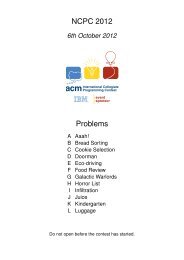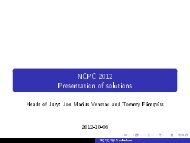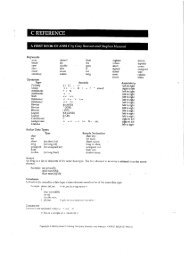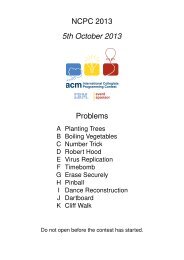Google Hacking Against Privacy
Google Hacking Against Privacy
Google Hacking Against Privacy
Create successful ePaper yourself
Turn your PDF publications into a flip-book with our unique Google optimized e-Paper software.
<strong>Google</strong> <strong>Hacking</strong> <strong>Against</strong> <strong>Privacy</strong><br />
Emin Islam Tatlı<br />
University of Mannheim, Department of Computer Science<br />
tatli@th.informatik.uni-mannheim.de<br />
(on leave to the University of Weimar)<br />
Key words: <strong>Google</strong> hacking, privacy, privacy searches<br />
Summary. <strong>Google</strong> facilitates our lives by finding any searched information within<br />
a single-click time. On the other hand, <strong>Google</strong> threatens our privacy by revealing our<br />
personal data to others. In this paper, we give examples of <strong>Google</strong> hacking against<br />
user privacy and discuss the countermeasures to protect our privacy from <strong>Google</strong> or<br />
in general from the search engines.<br />
1 Motivation<br />
<strong>Google</strong> is the most popular web search engine in internet. It indexes any<br />
information from web servers thanks to its hardworking web crawlers. But<br />
many personal data that should be kept secret and confidential are indexed<br />
by <strong>Google</strong>, too. This threatens our privacy. Personal data like name, address,<br />
phone numbers, emails, CVs, chat logs, forum and mailing list postings,<br />
username-password pairs for login sites, private directories, documents,<br />
images, online devices like web cameras without any access control, secret<br />
keys, private keys, encrypted messages, etc. are all available to others via<br />
<strong>Google</strong>. In addition to privacy risks, there are many more other security risks<br />
that can be revealed by <strong>Google</strong>. There exist an online database [3] which<br />
contains 1423 different <strong>Google</strong> hacking search queries by June 2007.<br />
This paper focuses on the advanced search queries that illustrate how<br />
<strong>Google</strong> reveals personal private data which are expected to stay private. Actually,<br />
other search engines reveal such private data too. But <strong>Google</strong> has<br />
become our target due to its huge index size. The paper is organized as follows:<br />
Section 2 summarizes the useful parameters for the advanced search in<br />
<strong>Google</strong>. In Section 3, examples of search queries against privacy are given.<br />
Section 4 explains possible security measures against <strong>Google</strong> privacy hacking.<br />
Finally, Section 5 explains our future work plan.
2 Emin Islam Tatlı<br />
2 <strong>Google</strong> Search Parameters<br />
In addition to the basic search operators (i.e. +,-,.), <strong>Google</strong> supports more<br />
parameters for the advanced searches and filters its results according to the<br />
parameters provided by the user.<br />
The [all]inurl parameter is used to filter out the results according to if<br />
the given url contains a certain keyword or not. If more keywords are needed<br />
to filter, the allinurl parameter should be used. [all]intitle filters the results<br />
according to the title of web pages. [all]intext searches the keywords in the<br />
body of web pages. With the parameter site you can do host-specific search.<br />
filetype and ext parameters have the same functionality and are needed to<br />
filter out the results based on the file extensions like html, php, pdf, doc,<br />
etc. The minus sign (-) can be put before any advanced parameter and reverses<br />
its behavior. As an example, a search query containing the parameter<br />
-site:www.example.com will not list the results from www.example.com. The<br />
operator "|" or the keyword OR can be used for binding different searches<br />
with the logical OR operation.<br />
3 <strong>Privacy</strong> Searches<br />
<strong>Google</strong> can reveal many personal data when its advanced search parameters<br />
are used. We have grouped private data searches into four different sections<br />
according to the privacy level. These are identification data, sensitive data,<br />
confidential data and secret data searches.<br />
3.1 Identification Data<br />
The identification data is related to the personal identity of users. Name, surname,<br />
address, phone number, marital status, CV, aliases, nicknames used<br />
over internet, etc. are the typical examples of identification data. Some private<br />
data searches would focus on a certain person and we choose the name<br />
“Thomas Fischer” which is a very common personal name in Germany.<br />
Name, Address, Phone, etc.<br />
You can search web pages and documents which contain keywords like name,<br />
address, phone, email, etc., optionally for a certain person or within certain<br />
document types.<br />
allintext:name email phone address intext:"thomas fischer" ext:pdf
<strong>Google</strong> <strong>Hacking</strong> <strong>Against</strong> <strong>Privacy</strong> 3<br />
Twiki 1 is a wiki-based web application that is commonly used for project<br />
management purpose. Inside TWiki, user data like name, address, phone numbers,<br />
web pages, location, emails, etc. are stored. If the required authentication<br />
techniques are not applied, unauthorized people can also access this data.<br />
intitle:Twiki inurl:view/Main "thomas fischer"<br />
In addition to <strong>Google</strong> search, other search engines with the capability of<br />
people finder can also be very helpful for gaining identification data. Yahoo’s<br />
People Search 2 , Lycos’s WhoWhere People Search 3 or eMailman’s People<br />
Search 4 connecting public ldap servers are examples of such services.<br />
Curriculum Vitae<br />
You can search for the keyword CV (curriculum vitae) that contain many<br />
personal data. This search can be extended by including translations of the<br />
CV in different languages. For example, Lebenslauf can be integrated in the<br />
search as the german translation for CV.<br />
intitle:CV OR intitle:Lebenslauf "thomas fischer"<br />
intitle:CV OR intitle:Lebenslauf ext:pdf OR ext:doc<br />
Usernames<br />
Webalizer web application 5 collects statistical information of web sites about<br />
visitor activities. The most commonly used login usernames are also stored<br />
by Webalizer.<br />
intitle:"Usage Statistics for" intext:"Total Unique Usernames"<br />
3.2 Sensitive Data<br />
The sensitive data means the data which are normally public but may contain<br />
private personal data and whose reveal may disturb its owner. The examples<br />
are emails, postings sent to lists, sensitive directories and Web2.0 based applications.<br />
1 Twiki: http://twiki.org<br />
2 Yahoo People Search: http://people.yahoo.com<br />
3 Lycos People Search: http://peoplesearch.lycos.com<br />
4 eMailman People Search: http://www.emailman.com/ldap/public.html<br />
5 Webalizer: http://www.mrunix.net/webalizer/
4 Emin Islam Tatlı<br />
Forum Postings, Mailinglists<br />
PhpBB 6 is a widespread web forum application. It enables to find out all<br />
postings sent by a particular user. The following search finds out all postings<br />
sent with the alias thomas to different phpBB-based forums.<br />
inurl:"search.php?search author=thomas"<br />
Mailman 7 is a well-known mailing list manager. The following search<br />
gives all email postings which are sent to mailman-based lists and related to<br />
Thomas Fischer.<br />
inurl:pipermail "thomas fischer"<br />
Sensitive Directories<br />
Backup directories can contain also some sensitive data about users, organizations,<br />
companies, etc.<br />
intitle:"index of" inurl:/backup<br />
Web2.0<br />
The next generation internet Web2.0 introduces more privacy risks. With<br />
Web2.0, people share more personal data with others. The following searches<br />
are based on the favorite Web2.0 sites like Yahoo’s Image Sharing 8 , <strong>Google</strong>’s<br />
Blogger 9 and <strong>Google</strong>’s Video Sharing 10 . Instead of searching through <strong>Google</strong>,<br />
searching directly on the original sites would give more efficient results.<br />
"Thomas Fischer" site:blogspot.com<br />
"thomas" site:flickr.com<br />
"thomas" site:youtube.com<br />
3.3 Confidential Data<br />
The confidential data is normally expected to be non-public for others except<br />
for a group of certain persons, but with <strong>Google</strong> it becomes possible to access<br />
to such private data as well.<br />
6 PhpBB Forum: http://www.phpbb.com<br />
7 Mailman List Manager: http://www.gnu.org/software/mailman/<br />
8 Yahoo Image Sharing: http://www.flickr.com<br />
9 <strong>Google</strong>’s Blogger: http://www.blogspot.com<br />
10 <strong>Google</strong> Video Sharing: http://www.youtube.com
<strong>Google</strong> <strong>Hacking</strong> <strong>Against</strong> <strong>Privacy</strong> 5<br />
Chat Logs<br />
You can search for chat log files related to a certain nickname.<br />
"session start" "session ident" thomas ext:txt<br />
Username and Password<br />
Username and password pairs can be searched within sql dump files and other<br />
documents.<br />
"create table" "insert into" "pass|passwd|password" (ext:sql |<br />
ext:dump | ext:dmp | ext:txt)<br />
"your password is *" (ext:csv | ext:doc | ext:txt)<br />
Private Emails<br />
Microsoft Outlook and Outlook Express store the personal emails within single<br />
database files like incoming messages within inbox.dbx. The following searches<br />
target the email storage files stored by Outlook Express or Microsoft Outlook.<br />
"index of" inbox.dbx<br />
"To parent directory" inurl:"Identities"<br />
Confidential Directories and Files<br />
Confidential directories and files can be revealed with the following query.<br />
"index of" (private | privat | secure | geheim | gizli)<br />
In order to prevent web crawlers to list private directories, Robot Exclusion<br />
Standard [6] is used. But it also enumerates a number of private directory<br />
paths within world-readable robots.txt files.<br />
inurl:"robots.txt" "User-agent" ext:txt<br />
Not only directories but also private documents and images can be<br />
searched through <strong>Google</strong>.<br />
"This document is private | confidential | secret" ext:doc |<br />
ext:pdf | ext:xls<br />
intitle:"index of" "jpg | png | bmp" inurl:personal | inurl:private
6 Emin Islam Tatlı<br />
Online Webcams<br />
Online webcameras come along with their software for the remote management<br />
over internet. Based on the type of the webcam, you can filter the url<br />
and the title as listed in [3] and access to the online webcam devices without<br />
any access control. As an example;<br />
intitle:"Live View / - AXIS" | inurl:view/view.shtml<br />
3.4 Secret Data<br />
Secret keys, private keys, encrypted messages compose of the secret data which<br />
is expected to be accessible only to its owner.<br />
Secret Keys<br />
Normally the secret keys are generated as session keys and destroyed after<br />
the session is closed. They are not permanently stored on the disks. But there<br />
are certain applications like Kerberos [5] that still need to store a secret key<br />
for each principal. The following query searches for dumped Kerberos key<br />
databases.<br />
"index of" slave datatrans OR from master<br />
Private Keys<br />
The following search reveals private keys that must be normally kept private.<br />
"BEGIN (DSA|RSA)" ext:key<br />
Gnupg [1] encodes the private key in secring.gpg files. The following search<br />
reveals secring.gpg files.<br />
"index of" "secring.gpg"<br />
Encrypted Messages<br />
The encrypted files with Gnupg have the extension gpg. Signed and public key<br />
files have also this extension. The following query searches for files with gpg<br />
extension and eliminates non-relevant signed and public key files.<br />
-"public|pubring|pubkey|signature|pgp|and|or|release" ext:gpg
<strong>Google</strong> <strong>Hacking</strong> <strong>Against</strong> <strong>Privacy</strong> 7<br />
Mostly the encryption applications use the extension enc for the encrypted<br />
files. This query searches for the files with the extension enc.<br />
-intext:"and" ext:enc<br />
In XML security, the encrypted parts of messages are encoded under CipherValue<br />
tag.<br />
ciphervalue ext:xml<br />
4 Countermeasures<br />
<strong>Google</strong> hacking can be very harmful against user privacy and therefore the<br />
required security countermeasures should be taken against it. The protection<br />
means can be grouped as user-self protection and system-wide protection.<br />
As the name implies, user-self protection requires the users to safeguard<br />
themselves against the possible threats. If we enumerate some points which<br />
the users should take care of:<br />
• Do not make any sensitive data like documents containing your address,<br />
phone numbers, backup directories and files, secret data like passwords,<br />
private emails, etc. online accessible to the public.<br />
• Provide only required amount of personal information for the Wiki-similiar<br />
management systems.<br />
• Instead of using a single username over the internet, try to hold more<br />
pseudonyms which make linkability of user actions through a single username<br />
more difficult.<br />
• Considering the forum postings and group mails, try to stay anonymous<br />
for certain email contents. Do not mention any company or organization<br />
name inside the postings if not required.<br />
• Do not let private media get shared over Web2.0 services.<br />
• Enable authentication techniques for your installed online devices like webcams,<br />
printers, etc.<br />
As an administrator, you should focus on system-wide protection for the<br />
privacy of their users. The first method you can use is automatic scan tools<br />
[4, 7, 8] that search possible <strong>Google</strong> threats and test privacy risks within<br />
your system. The tools mostly use the hack database [3] when they do scan.<br />
Another method is integration of robots.txt (robots exclusion standard) [6]<br />
files into your system. Web crawlers (hopefully) respect the directives specified<br />
in robots.txt. Providing this, you can prevent the crawlers from indexing your<br />
sensitive files and directories. In addition to this method, you should never<br />
put database backups that contain usernames and passwords accessible over<br />
your system. The most advanced but also complicated method is installing
8 Emin Islam Tatlı<br />
and managing <strong>Google</strong> honeypots [2] in your system and trying to figure out<br />
the behavior of attackers before they attack your real system.<br />
5 Future Work<br />
The users can be equipped with a penetration testing tool that would search<br />
automatically for the possible privacy threats and report its results. Providing<br />
this, the users can be aware of the privacy risks which threaten them. We<br />
are currently implementing such a tool which will search <strong>Google</strong> mainly for<br />
the privacy risks mentioned in this paper for a specific person and a specific<br />
host. Besides, the tool will have a support of finding cryptographic secrets as<br />
explained in [9] in details.<br />
References<br />
1. The gnu privacy guard. http://www.gnupg.org.<br />
2. <strong>Google</strong> Hack Honeypot Project. http://ghh.sourceforge.net.<br />
3. <strong>Google</strong> <strong>Hacking</strong> Database. http://johnny.ihackstuff.com/index.php?module=prodreviews.<br />
4. Goolink- Security Scanner. www.ghacks.net/2005/11/23/goolink-scanner-betapreview/.<br />
5. Kerberos: The network authentication protocol. http://web.mit.edu/Kerberos/.<br />
6. Robots exclusion standard. http://en.wikipedia.org/wiki/Robots.txt.<br />
7. SiteDigger v2.0 - Information Gathering Tool.<br />
http://www.foundstone.com/index.htm?subnav=resources/navigation.htm&subcontent=<br />
/resources/proddesc/sitedigger.htm.<br />
8. Johnny Long. Gooscan <strong>Google</strong> Security Scanner.<br />
http://johnny.ihackstuff.com/modules.php?op=modload&name=Downloads<br />
&file=index&req=getit&lid=33.<br />
9. Emin Islam Tatli. <strong>Google</strong> reveals Cryptographic Secrets. Technical Report of 1.<br />
Crypto Weekend, Kloster Bronbach, Germany, July 2006.


